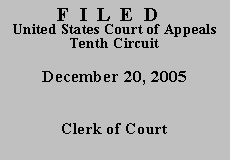

| UNITED STATES OF AMERICA, |
|
| v. | |
| RENE HERRERA, JR., |
|
I. Background
Mr. Herrera was indicted for conspiracy to distribute methamphetamine and distribution of methamphetamine. He pleaded guilty to the conspiracy charge on August 18, 2003. In the plea agreement, Mr. Herrera waived his right to directly appeal or collaterally challenge his sentence. On November 3, 2003, he was sentenced to 168 months' imprisonment. When sentencing Mr. Herrera, the district court made factual findings about drug quantities under the preponderance of the evidence standard.
On February 1, 2005, Mr. Herrera filed a motion to vacate, set aside or correct his sentence pursuant to 28 U.S.C. § 2255, in which he asked the district court to vacate his sentence under United States v. Booker, 543 U.S. 220 (2005). The government, in response, filed a motion to enforce Mr. Herrera's plea agreement and waiver of rights. On April 7, 2005, the district court denied Mr. Herrera's motion, finding that he waived his right to collaterally challenge his sentence and, alternatively, that Booker does not apply retroactively to claims on collateral review. The district court denied Mr. Herrera's request for a COA on May 6, 2005.
II. Claims on Appeal
The denial of a motion for relief under 28 U.S.C. § 2255 may be appealed only if the district court or this Court first issues a COA. 28 U.S.C. § 2253(c)(1)(B). A COA will issue "only if the applicant has made a substantial showing of the denial of a constitutional right." 28 U.S.C. § 2253(c)(2). In order to make such a showing, a petitioner must demonstrate that "reasonable jurists could debate whether . . . the petition should have been resolved in a different manner or that the issues presented were adequate to deserve encouragement to proceed further." Slack v. McDaniel, 529 U.S. 473, 475 (2000) (internal quotation marks omitted).
In this request for a COA, Mr. Herrera makes three arguments: (1) the district court should have held an evidentiary hearing on his claim of ineffective assistance of counsel, (2) his waiver of the right to appeal his sentence was not knowing and voluntary, and (3) lengthening his term of imprisonment based on facts about drug quantities determined by a judge, rather than by a jury, is constitutional error remediable on collateral review. We turn first to Mr. Herrera's contention that the district court should have afforded him an evidentiary hearing on his claim of ineffective assistance of counsel.
Mr. Herrera never presented a broad claim of ineffective assistance of counsel to the district court. In his habeas corpus petition before the district court, Mr. Herrera stated only that his "sentence is unconstitutional under the Fifth and Sixth Amendments." R. Doc. 35, p. 5. Later, in his response brief before the district court, he claimed that his waiver of collateral relief was invalid because counsel was ineffective by inaccurately asserting that Mr. Herrera would receive a ten-year sentence. As the district court noted, however, Mr. Herrera did not "suggest that his counsel in any way assured him that his sentence would be no more than 10 years or otherwise misinformed or improperly counseled him as to the potential sentence he might receive. Rather, Mr. Herrera state[d] that he simply 'assumed' he would be sentenced to the statutory minimum based on the facts to which he pled guilty." Moreover, during the colloquy with the district court, Mr. Herrera stated that he was aware that the guideline range would be determined after the presentence investigation, and could be affected by other information, including information relevant to crimes to which he did not plead guilty. This provides no basis for a claim of ineffective assistance of counsel.
As to Mr. Herrera's remaining claims, we need not decide whether Mr. Herrera knowingly and intelligently waived his right to collateral review because his constitutional challenge to his sentence fails. Mr. Herrera claims that the Supreme Court's decisions in Blakely v. Washington, 542 U.S. 296 (2004), and United States v. Booker, 543 U.S. 220 (2005), apply retroactively to invalidate his sentence. However, this Court has held that "Booker does not apply retroactively to initial habeas petitions." United States v. Bellamy, 411 F.3d 1182, 1186 (10th Cir. 2005) (denying a COA to a federal prisoner, sentenced in 2003, who raised a Booker challenge). Thus, Mr. Herrera cannot challenge his sentence under Booker, as he was sentenced in November 2003 and raised this claim for the first time on collateral review.
III. Conclusion
Accordingly, we DENY Rene Herrera's request for a COA and DISMISS this appeal.
Entered for the Court,
Michael W. McConnell
Circuit Judge
*.This order is not binding precedent, except under the doctrines of law of the case, res judicata, and collateral estoppel.